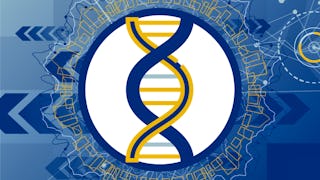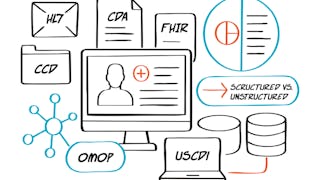This course is best suited for individuals currently in the healthcare sector, as a provider, payer, or administrator. Individuals pursuing a career change to the healthcare sector may also be interested in this course.

Enjoy unlimited growth with a year of Coursera Plus for $199 (regularly $399). Save now.

Health Informatics for Healthcare Professionals

Instructor: Dr. John D. Halamka, M.D., M.S.
5,442 already enrolled
Included with
(31 reviews)
Recommended experience
What you'll learn
Describe the history and current status of information systems in healthcare
Identify and describe the functions and evolution of the electronic health record systems
Interpret the relationship between information retrieval, data standards and decision support system
Skills you'll gain
- Data Management
- Digital Transformation
- Health Information Management
- Data Sharing
- Decision Support Systems
- Health Informatics
- Health Care
- Health Care Administration
- Artificial Intelligence
- Electronic Medical Record
- Interoperability
- Health Technology
- Clinical Informatics
- Health Systems
- Data Storage
- Health Information Management and Medical Records
Details to know

Add to your LinkedIn profile
See how employees at top companies are mastering in-demand skills

There are 4 modules in this course
Technology has transformed the healthcare landscape in so many ways. From the origins of the patient record to the development of cloud computing technologies, to wearables and artificial intelligence, the purpose of data collection has evolved. In this module, we will explore the history of cloud computing and data science. As health information systems change, so does the need for more specialized health IT leadership roles within organizations. You will examine these different roles and unique responsibilities each has in the organization’s development and strategic planning process. By the end of this module, you will have a firm understanding of the history of health informatics and how these technologies have shape the healthcare landscape of the future.
What's included
7 videos6 readings1 quiz6 assignments2 discussion prompts
As data collection in healthcare continued to grow and expand beyond simple storage and retrieval of basic information, the need for standardization across the healthcare industry became imperative. In this module, you will explore the three main types of data standards and the types of data vocabularies that are used throughout the healthcare ecosystem.
What's included
4 videos4 readings4 assignments1 peer review
In this module you will continue to learn about data standards, shifting focus to follow the various standardization initiatives such as FHIR and DICOM and how these initiatives were able to transform how healthcare data is presently stored. You will also reflect upon the relationship between standards, data storage modalities, and natural language processing and how the three can be used to develop models for the future that will help organizations provide better patient care.
What's included
3 videos5 readings1 quiz3 assignments
In this module, you will dive further into exploring health information systems, now focusing on clinical decision support (CDS) systems. These systems can provide value to clinicians, increasing productivity and supporting clinical processes. With incorporation of these systems, can also bring challenges and complexities. In this module you will explore the benefits and challenges of integrating CDS systems in the healthcare organization. Then you will compare different approaches to storing and controlling data collections. Finally, you will be introduced to the idea of a global algorithm registry and what it could mean for the future of information systems.
What's included
7 videos6 readings1 quiz6 assignments1 discussion prompt
Instructor

Offered by
Explore more from Health Informatics
 Status: Preview
Status: PreviewNortheastern University
 Status: Free Trial
Status: Free TrialJohns Hopkins University
 Status: Free Trial
Status: Free TrialMedCerts

Illinois Tech
Why people choose Coursera for their career




Learner reviews
31 reviews
- 5 stars
80.64%
- 4 stars
16.12%
- 3 stars
0%
- 2 stars
3.22%
- 1 star
0%
Showing 3 of 31
Reviewed on Feb 11, 2025
A good introduction to Health Informatics. The peer-review aspect of the assignments was frustrating, as it took quite a while for those assignments to be graded. Otherwise, a very helpful course.
Reviewed on Aug 31, 2023
Great course! It was challenging enough to not be boring. The professor was excellent!! I truly enjoyed this course. Thank you!
Reviewed on Feb 15, 2024
Takes a long time to resolve issues raised. I’m still waiting to resolve the report an issue flag

Open new doors with Coursera Plus
Unlimited access to 10,000+ world-class courses, hands-on projects, and job-ready certificate programs - all included in your subscription
Advance your career with an online degree
Earn a degree from world-class universities - 100% online
Join over 3,400 global companies that choose Coursera for Business
Upskill your employees to excel in the digital economy
Frequently asked questions
To access the course materials, assignments and to earn a Certificate, you will need to purchase the Certificate experience when you enroll in a course. You can try a Free Trial instead, or apply for Financial Aid. The course may offer 'Full Course, No Certificate' instead. This option lets you see all course materials, submit required assessments, and get a final grade. This also means that you will not be able to purchase a Certificate experience.
When you purchase a Certificate you get access to all course materials, including graded assignments. Upon completing the course, your electronic Certificate will be added to your Accomplishments page - from there, you can print your Certificate or add it to your LinkedIn profile.
Yes. In select learning programs, you can apply for financial aid or a scholarship if you can’t afford the enrollment fee. If fin aid or scholarship is available for your learning program selection, you’ll find a link to apply on the description page.
More questions
Financial aid available,
¹ Some assignments in this course are AI-graded. For these assignments, your data will be used in accordance with Coursera's Privacy Notice.

